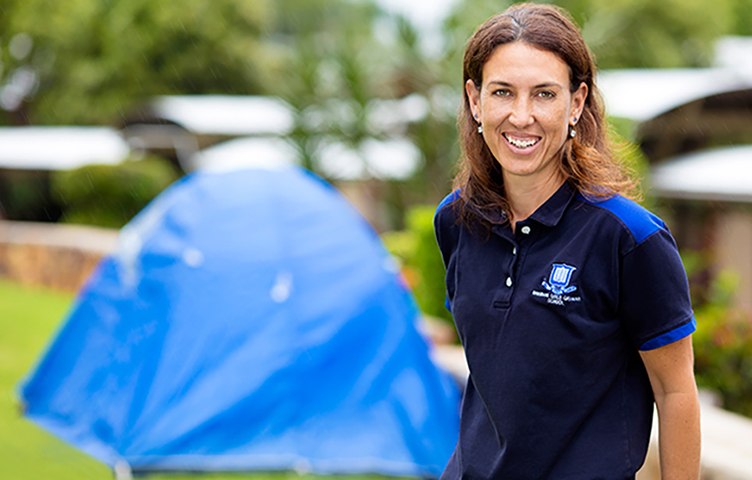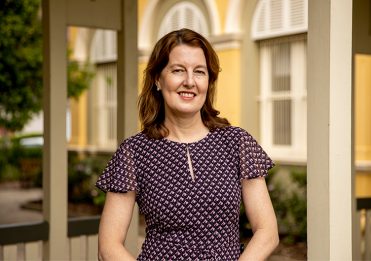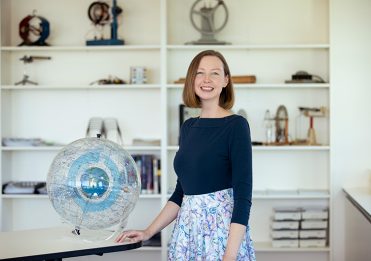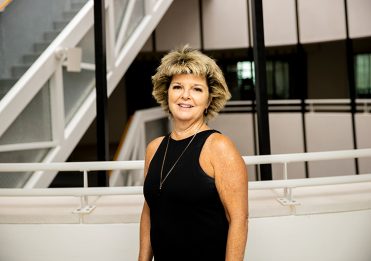
Mrs Carol McIntosh, Outdoor Education Teacher at Marrapatta Memorial Outdoor Education Centre, welcomes hundreds of Girls Grammar students to her home every year. Although it can be challenging, Carol has discovered that her role is a natural fit.
I woke up one morning a few weeks ago, and the first thing I said was ‘the bowerbirds are back!’
It was only when I heard myself speak that I realised I had been semi-consciously waiting for their return. Once you get to know the rhythms of the animals and the environment around you, you almost become a part of it without even realising.
James, my husband, and I have lived and worked at Brisbane Girls Grammar School’s Marrapatta Memorial Outdoor Education Centre for 15 years now. For me, the small moments are what have stood out most during this time: a moment of humour, where the girls show their character; or a still day on the dam, when the water is glassy and clear and the sun is warm. In the midst of the ‘busyness’ of managing and delivering our programs, it’s affirming to still be able to connect to nature, and to one another.
When I look back, I guess you could say that I grew up with a great appreciation of the outdoors—but it wasn’t really something I was conscious of at the time, it just gradually emerged.
My family and I spent a lot of time with my grandparents when I was young. My grandparents travelled frequently, and hearing about their experiences always inspired me. They owned a property at Stradbroke Island, and we spent plenty of holidays there. I had quite a bit of freedom on the island; it was a nice little community, and I felt safe there. As I got older, I ‘went bush’ more and more—I explored the sprawling coastal tracks and would wander off for hours at a time.
I saw my grandfather as the holder of all wisdom. He knew all the species of the trees and the animals; he knew about the stars and constellations. But, as I grew older, I realised that his knowledge only extended so far. Eventually, I was learning more about nature than even he understood—that was quite a surprising revelation to me.
The reason I ended up pursuing a career in outdoor education is because I happened to be in the right place at the right time—not just once, but at many points along my journey.
At university, I studied a Bachelor of Education, majoring in Physical Education and Biology. I was (and still am) a hockey player and being active is an essential part of my life, so these disciplines suited me well.
I studied a unit on Outdoor Education and loved it, but didn’t think too much more about it, at least initially. I studied with a young man named James McIntosh. We met in a Biology class, and we haven’t been too far from one another ever since.
After we finished our undergraduate degrees, we both taught at different schools, in different locations. Our university offered a Master’s Degree in Outdoor Education, and given we both loved the outdoors, we had kept it in the back of our minds as a possible study option for the future. While we were working, we learned that the university was discontinuing the degree, so we took our last opportunity to study the program and ended up studying together again.
James was working in Toowoomba after we got married, and I had taken some classroom-based positions in an attempt to be in the same city. Then, two roles came up at Girls Grammar’s Marrapatta campus, and we knew it was a perfect fit for us—once again, it was a bit serendipitous, really.
At the start, James and I were the only teaching staff at Marrapatta. It was a big job, but we kept busy and threw ourselves into our different roles. Working with a spouse is certainly a unique type of challenge. We have a good grounding because we studied together, so before we started working together, we already knew exactly how the other person operated. We also share the same philosophy about education and the importance and natural beauty of the outdoors.
I particularly appreciate that this role offers the chance to enjoy repeated, shared experiences with the girls. We get to know them more and more each time we see them, and we have the privilege to watch them as they grow and develop their own unique personalities.
Often, those girls who have had to put their minds to their tasks are the ones who truly shine and reap the most rewards from their outdoor education experience.
One student who stands out in my memory is a girl who had never ridden a bike before. The weekend before she arrived at Marrapatta she had set herself a goal to learn how to ride, so that she could participate while on camp. During the week, with much perseverance, she was able to build on her new skills and really excel. Her classmates got behind her and built her up, encouraging her along the way. For me, that story really encapsulates what Marrapatta is all about—pushing beyond what you believe your limits to be, and supporting those around you to achieve their best.
I have ended up teaching outside the classroom because I can see the value of the life skills that are gained here. Outdoor education is not about teaching for content, but teaching for students’ personal development. It is about learning how to work together, how to bounce back, and what to do when things are difficult. These skills are applicable no matter where you go—they are essential to almost every aspect of living and working with others—and I’m privileged to help teach them.




